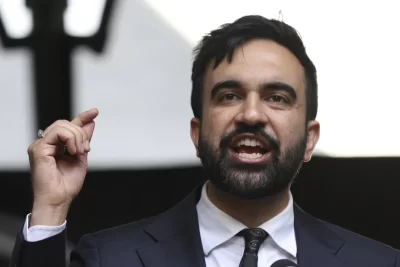
TEL AVIV, Israel — Rocket barrages from Lebanon into northern Israel killed four foreign workers and three Israelis on Thursday, Israeli medics said, the deadliest cross-border strikes in Israel since it invaded Lebanon. Israel kept up airstrikes it says targeted Hezbollah militants across Lebanon, where health authorities on Thursday reported 24 people killed.
U.S. diplomats were in the region pushing for cease-fires in both Lebanon and Gaza, hoping to wind down the wars in the Middle East as the Biden administration enters its final months. Pressure has been building ahead of the U.S. election next week.
In northern Gaza, Israeli forces struck one of the last functioning hospitals, according to the World Heath Organization said, destroying much-needed supplies that the U.N. agency had delivered to the facility. The strikes set off a fire that affected the dialysis unit, destroyed water tanks, damaged the surgery building and injured four medics trying to extinguish the blaze, said the hospital’s director, Dr. Hussam Abu Safiya.
The Israeli military did not respond to a request for comment about a strike on the hospital, which it stormed last week after alleging it was harboring Hamas militants. Gaza’s Health Ministry on Thursday condemned Israeli attacks on the hospital and called on the international community to safeguard medical facilities in Gaza.
Back-to-back deadly rocket attacks hit Israel
Projectiles from Lebanon crashed into an agricultural area in Metula, Israel’s northernmost town, killing four foreign workers and an Israeli farmer, local officials said Thursday.
Hours later, the Israeli military reported another volley of some 25 rockets from Lebanon, striking an olive grove in a suburb of the northern Israeli port city of Haifa. That strike killed a 30-year-old man and 60-year-old woman while wounding two others, said Magen David Adom, Israel’s main emergency medical organization.
Both Hezbollah and Hamas are backed by Iran, Israel’s regional adversary. Hezbollah did not immediately claim responsibility for Thursday’s rocket fire. Israel’s military said 90 projectiles were fired from Lebanon on Thursday.
Hezbollah has been firing thousands of rockets, drones and missiles into Israel —and drawing fierce Israeli retaliatory strikes — over the past year since Hamas’ Oct. 7, 2023, attack out of the Gaza Strip triggered Israel’s devastating war in the Palestinian enclave.
The residents of Metula evacuated in October 2023, and only security officials and agricultural workers remain. The Hotline for Refugees and Migrants, an Israeli organization that advocates for foreign workers, said authorities had put them in danger by allowing them to work along the border without proper protection.
Agricultural areas near Israel’s border are closed military zones that can only be entered with official permission. For the few remaining residents, the thump of interceptions by Israel’s Iron Dome missile defense system and wailing air raid sirens punctuate daily life.
Nonetheless, local officials largely support continuing a ground operation in southern Lebanon.
“If the Israeli government accedes to an agreement brought by (the Biden administration) … we will not have it because for us this is rehabilitating Hezbollah again on our borders,” said Eitan Davidi, the mayor of the northern town of Margaliot.
Israeli bombs across Lebanon after evacuation warnings
Israeli strikes killed 24 people in Lebanon on Thursday, among them 13 people in the country’s eastern Bekaa Valley, according to Lebanon’s state-run National News agency, a day after the Israel’s military warned residents there to evacuate.
The warnings sent thousands of people fleeing and spread panic across the city, known for its colossal Roman ruins.
The Lebanese Health Ministry reported that over the last 24 hours, Israeli bombardments killed 45 people and wounded 110 in various parts of the country.
Jean Fakhry, a local official in the Deir al-Ahmar region in the Bekaa Valley, said Israeli airstrikes pummeling the area turned the main highway “a parking lot” of fleeing cars stuck in traffic.
Around 12,000 displaced people are staying in the area, he said, with most taking refuge in private homes. At one of the shelters in Deir al-Ahmar, families with luggage were still arriving Thursday.
“Our homes were destroyed,” said Zahraa Younis, from the village near Baalbek. “We came with nothing — no clothes or anything else.”
US officials are in the region seeking a cease-fire
Senior White House aides Brett McGurk and Amos Hochstein were in Israel Thursday for talks with Prime Minister Benjamin Netanyahu and senior officials about the conflicts with Hamas and Hezbollah.
The meetings focused on efforts to secure a cease-fire deal in Lebanon and to assess new proposals floated by mediators to free Israeli hostages being held in Gaza, according to a U.S. official familiar with planning for the talks who spoke on condition of anonymity because they were not authorized to comment publicly. The meetings were attended by Netanyahu as well as Yoav Gallant, the Israeli defense minister; David Barnea, the director of the Mossad, Israel’s foreign intelligence agency; and other officials.




